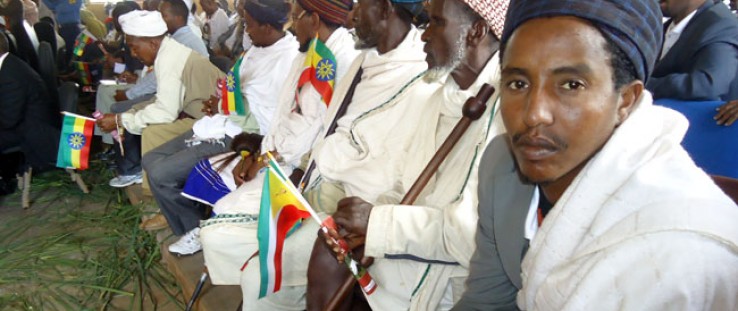 Mercy Corps
Mercy Corps
 Mercy Corps
Mercy Corps
A dusty town in the Somali region of Ethiopia, Hudet had been the focal point of a longstanding conflict. For decades, four clans—the Gari, Guji, Gebra and Borena—had competed over scarce resources and fought over a vast territory along the disputed borderlands between Ethiopia’s Somali and Oromiya regional states.
Clashes among the groups had regularly escalated into violence that destabilized pockets of the region. Historically, these clashes included cattle-raiding and revenge-killing, driven by competition for control over key resource areas that support local livelihoods, as well as a culture that often rewards displays of violence. In 2009, a particularly devastating conflict over access to key resources among these communities resulted in many deaths and large-scale displacement.
But by July 2011, this tension and conflict were no longer apparent in Hudet. Women in brightly colored dresses and headscarves went about their business, kids chased each other down the road, and a teenage boy ambled through town with his herd of cattle. A Somali couple had opened a modest, new hotel, evidence of the peace that had ushered in investment.
For the previous two years, USAID and Mercy Corp’s Strengthening Institutions for Peace and Development program had been supporting government, traditional institutions and the wider community to build peace among the four clans of the Somali and Oromo people who make their living as pastoralists or farmers in these remote, arid lands.
The program, part of USAID’s focus on good governance and conflict mitigation, supports Ethiopia’s peace-building goals at both the national and local levels. The Negele Peace Accord is an example of USAID’s broader efforts—extending across much of the southern half of Ethiopia—to strengthen the collaboration of government (federal, state and local) and community actors in mitigating and preventing future episodes of violent conflict.
With support from USAID and Mercy Corps, government and community institutions led peace-building trainings, consultative meetings, and dialogues with clan elders, religious leaders, women, and youth groups to address the complex conflict issues that most people had come to see as intractable.
Slowly, perceptions shifted; people began to view peace as a possibility and ceased to see violence as a necessity. Key leaders from the clans began drafting a peace accord, which they repeatedly submitted to their communities for feedback and revision. After a year of community and government consultations, clan leaders ratified the final draft, and previously conflicting communities began successfully implementing a shared set of laws. The clans began to openly share natural resources, markets, and services in the former contested territories, improving their overall livelihood options. Social and economic interaction flourished.
“When we agree and collaborate, not only our peace but our total well-being is improved. This way is better and also brings a solution to our problems,” observed Abba Gada Dambibo, a representative of the Guji.
These were unprecedented, historical accomplishments for the people of the Borena, Gabra, Guji, and Gari clans, a combined population of more than 82,500 people. Ethiopia’s minister of federal affairs and the Somali and Oromiya regional vice presidents placed their signatures on the peace accord along with the clan leaders.
“This agreement shows determination from all parties, and even if conflict arises, it is stated here that it will be resolved peacefully. This is a great success for you and a lesson for other communities,” said Federal Affairs Minister Shiferaw Tekle-Mariam.
Over 800 people came to the ratification ceremony in Negele Borena. They walked, took buses, and drove from all over the country. Most made camp together outside the town, sharing food and stories late into the night. In their speeches, Shiferaw and the Borena clan leader reiterated the core reason that they believed this peace would last: Unlike previous, unsuccessful reconciliation efforts that were initiated by the government, this time the momentum came from the community.
Peace, Tested
Related Content
In the months following, the peace accord was put to a test: A drought affecting the area was becoming increasingly more severe. Droughts put stress on available food and drinking water as well as grazing land and water for livestock, threatening the very livelihoods of the population.
Based on an assessment of the drought situation in the conflict-affected area in July 2011, the water points in the communities were almost dried up, with most of the villages relying on water trucking. Communities were rapidly losing their livestock assets, with many households at risk of losing their entire herds, meaning they would have little options for recovery even when rains returned. Women, children and the elderly were suffering from lack of livestock products, particularly milk and ghee, and general food shortages in local markets.
However, Gari clan elders explained their livestock were surviving—the peace accord permitted herders from all the clans to take livestock deep into Borena territory, to the only grazing land that had received decent rainfall. “We are so interdependent that if someone believes there are issues that should lead us to fight, it is out of ignorance,” said Borena clan leader Abba Gada Guyo.
They were sharing other resources, too, and the market in Hudet was functioning again, offering commodities that people desperately needed. A follow-up study demonstrated that the trust that resulted from the peace process and accord meant that communities in this area were better able to cope with the 2011 drought as compared to their neighbors.
When disagreements threatened to reignite old tensions between clans, the elders and local government officials from concerned communities used conflict prevention and negotiation training to find a path forward.
Abba Gada Dambibo articulated the wisdom gained from the conflict prevention and mediation training: “If we agree and collaborate, not only our peace but our total well-being will be improved.”
Said USAID/Ethiopia Mission Director Tom Staal: “It was clear that, although the difficult environmental and political factors that drove conflict in the region for generations had not necessarily improved, the communities’ willingness and capacity to jointly cope with those challenges had.”
As one elder explained, “These problems have been going on since our grandfathers. We don’t expect them to be solved in a year.” Jennifer Westervelt is with Mercy Corps.







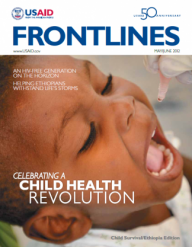

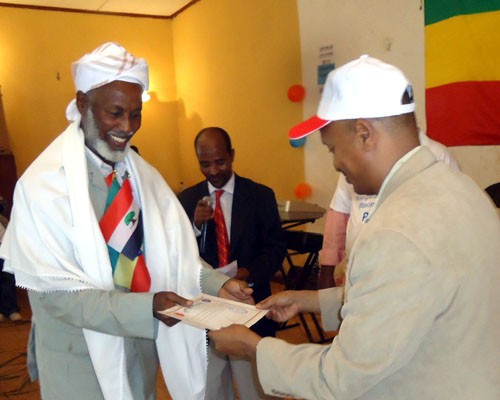
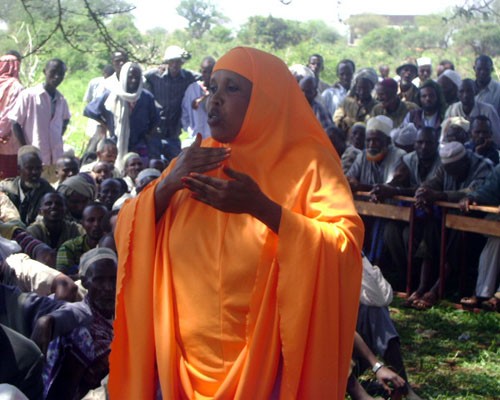
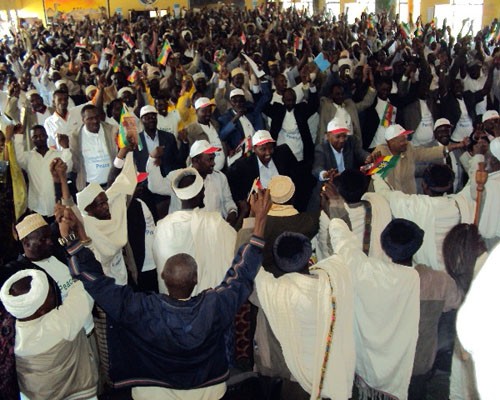
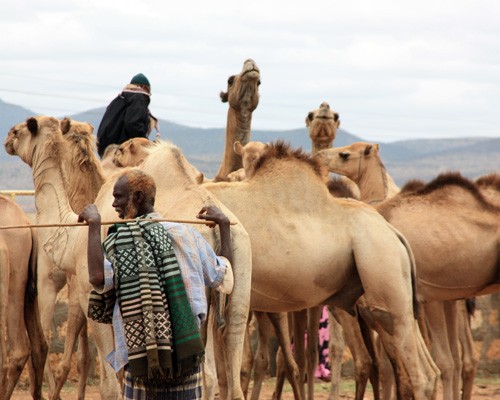
Comment
Make a general inquiry or suggest an improvement.